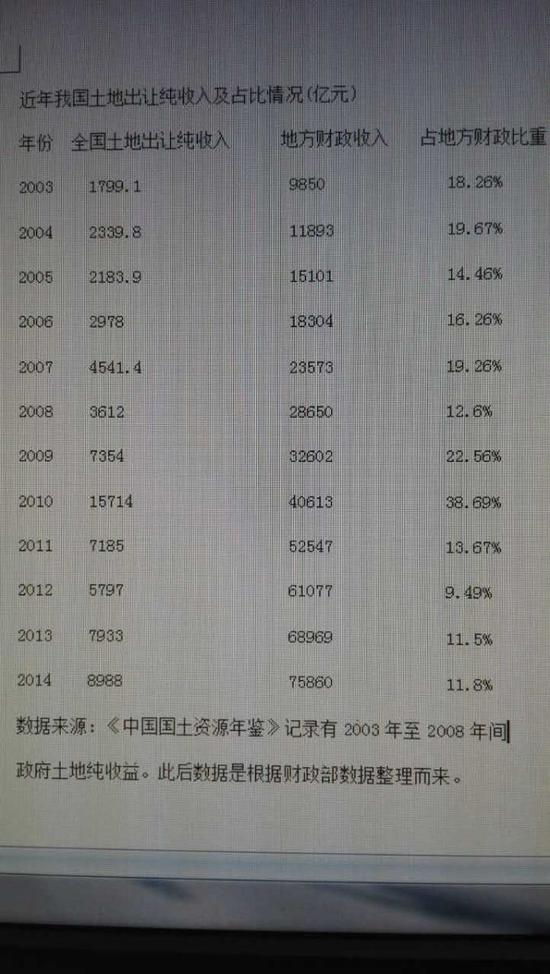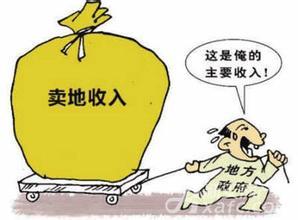Minus the land expropriation costs local governments in China each year from a profit of 600 billion | demolition | land profits _ news
From 1999 to 2015, 17 years is the fastest of land assets in Chinese history, national land sales totaled about 27.29 trillion yuan, annual average of 1.6 trillion yuan.
However, the money is not all local government revenue, the current land sales for "gross revenues" includes land acquisition compensation expenditures, early land development expenditure, benefit landless farmers spending, such spending for government tax, reserves, sorting links early advances, such as the cost of land.
If you subtract these costs can reckon that local governments can get the whole "profit" exactly how many?
I read a lot of information and statistics, 179.91 billion yuan since 2003 to 2014 898.8 billion yuan, this 12 years of local Government's land transfer net proceeds of about 7.0433 trillion yuan, annual 586.9 billion yuan.
From 2003 to 2014, the land transfer revenue around 23.55 trillion yuan for the period, overall, these 12 years the land profit 29.9% per cent of revenues.

Official and private research
Although many scholars and practitioners of land finance has long been criticized, but on the issue of land transfer income is very rare. One of the main reasons is less official publication of these data only from the ladder pulled out of its cocoon can be seen in various materials.
Share of net profit of land issues, officials have also provided data.
On November 28, 2012, the people's daily, was published when he was Vice Minister of Finance Wang Baoan of signed articles to create a new situation for the development of financial theory, the article said: the assignment of the land transfer net income income of less than 1/3, not to the local 10% of the available financial resources. Simply mention "land of financial" is neither objective nor scientific, but also easy to mislead the decision.
August 2016 Wang Baoan was expelled from the party and public officials for serious disciplinary violations.
Treasury in the 2014 national land transfer revenue and expenditure projections, this type of cost accounts for about of land transfer income 80%. In 2014, after deducting the cost expenditures, when the formation of land transfer income was 898.793 billion yuan, an increase of 13.3%, accounting for land sales by 20.9%.
Based on 2014 local 7.586 trillion yuan of revenue in China, land transfer ratio of net income to local revenue of about 11.8%.
In the Yearbook of the Ministry of land and resources, China has provided local government land between 2003 to 2008 net income, but this data will no longer be involved in 2009 year.
This practice also causes in recent years, the lack of official data, objective research on the financial problems of the land created obstacles.
However, scholars also conducted a simple calculation of the official data.
Xu Zhenyu in 2013, Vice President of Beijing technology and business University, College of Economics, referred to in an article in a set of data, came to 2008-2012 five years conclusion of land transfer income of about 4.1 trillion yuan of local government.
According to their calculations, local revenue proportion of land transfer income, in addition to 2012 for 9.49%, other than two digits of the year, the highest in 2010 to more than 38%.
On the question of the data source, Xu Zhenyu told the newspaper in an interview said that data from the annual budget execution report, official website of the Ministry of land and resources and the China statistical abstract (2012).
However, these sources do not "land transfer income" this data, his are based on calculated, namely land total income minus the total number of land transfer income and expenses.

Land is not only to earn money
Xu Zhenyu thinks, if only to measure the land transfer revenue, the Government won huge gains. But does not take into account all expenditures related to land (in particular spending on land acquisition and compensation), thus seriously overestimated the real income obtained from land by the Government and exaggerated the "land of financial" significance to the local government. Only after the deletion of the full cost of land transactions, the land's net income is disposable parts of local government.
Once considered the cost of expenditure, national land net income as a percentage of national revenues and local revenue, there will be significant shrinkage. Even in the highest percentage in 2010, land transfer income total revenues and local revenue share of 18.91% and 38.69% respectively, 2011 quickly drop to 6.92% and 13.67% (even less than 2008 levels), 2012 is further reduced to 4.95% and 9.49%.
He think, is will appeared land transfer net income of constantly declined, except local government for prevent funds too much surrendered to superior Government and began conscious to "ambushes" of consider zhiwai, another very important of factors is State-owned land Shang housing levy and Compensation Ordinance of implement implementation, and rural residents activist consciousness of constantly growth, "nail" of extreme against and all group event, local Government was forced to improve has land and demolition compensation standard, Led the Government from selling state-owned land in the net income (income after deducting expenditures for land compensation) rapidly reduced in recent years.
Despite the Government's land transfer income further reduced in recent years, but the local government is still keen to land purchases. Land finance mode of operation, directly through the land to make money is a factor, building local government financing platforms take this point.
Through land sector stockpiling a large amount of land, make the land market, investment and financing platform can take this big city (increase in mortgage land), increased investment in urban infrastructure construction, and commercial land prices increased real estate market is also larger, with tax increases.
The 2015 China land and resources Communique shows that by the end of 2015, 84 major cities across the country in a State of mortgage was 490,800 hectares of land, mortgages totaled 11.33 trillion yuan, compared with growth of 8.8% and 19.1%, respectively.
Responsible editor: Sun Ailin SN146
Article keywords:Land acquisition and relocation of the land profits
I want feedback
Save a Web page
First financial daily
减去征地成本 中国地方政府每年从征用土地一项获利6千亿|征地拆迁|土地利润_新闻资讯
从1999年至2015年,这十七年是中国历史上土地资产化最为迅猛的年代,全国土地出让收入总额约27.29万亿元,年均1.6万亿元。
不过,这些钱也不全是地方政府的收入,现行土地出让收入为“毛收入”,包含征地拆迁补偿支出、土地出让前期开发支出、补助被征地农民支出等,这类支出为政府在征收、储备、整理土地等环节先期垫付的成本。
如果减去这些成本,能否算一算地方政府能够到手的“土地利润”到底有多少?
笔者查阅大量资料后统计出,自2003年的1799.1 亿元到2014年的 8988亿元, 这12年间地方政府获得的土地出让纯收益约为70433亿元,年均5869亿元。
而从2003年到2014年,这期间的土地出让总收入约为23.55万亿元,总体来看,这12年间土地出让纯收益占到总收入的29.9%。

官方说法与民间研究
虽然有不少学者和业界人士对土地财政诟病已久,但民间有关土地出让纯收入问题的研究却很少见。其中一个主要原因是官方较少公布这些数据,只能从各类材料中抽丝拔茧方能窥见一斑。
对于土地纯收益的比重问题,官方有过说法也曾提供过数据。
2012年11月28日 《人民日报》上,曾刊登了时任财政部副部长王保安的署名文章《开创财政理论发展新局面》,文章中称:土地出让纯收益占出让收入还不到1/3,不到地方可用财力的一成。简单地提“土地财政”,既不客观,也不科学,还容易误导决策。
2016年8月,王保安因严重违纪被开除党籍和公职。
财政部在《2014年全国土地出让收支情况》曾推算,此类成本性开支大约占土地出让收入的八成左右。如2014年,扣除成本性支出后,当年形成的土地出让收益为8987.93亿元,同比增长13.3%,占全国土地出让收入20.9%。
据此计算,2014年中国地方财政收入为75860亿元,土地出让纯收益占地方财政收入的比例约为11.8%。
《中国国土资源年鉴》中曾提供过2003年至2008年间地方政府的土地纯收益,但在2009年后这一数据便不再涉及。
这一做法也造成了近年来官方数据的缺失,客观上对土地财政问题的研究制造了障碍。
不过,也有民间学者进行过对相关官方数据进行过简单测算。
北京工商大学经济学院副院长徐振宇2013年曾在一篇文章中提及一组数据,得出了2008至2012年五年间,地方政府土地出让纯收入约4.1万亿元的结论。
据其测算,土地出让纯收入占地方财政收入比重,除了2012年为9.49%外,其他年份超过了两位数,最高的2010年超过了38%。
就其数据来源问题,徐振宇在接受《第一财经日报》采访时曾表示,其数据来源于历年财政预算执行报告、国土资源部官方网站及《中国统计摘要(2012)》。
不过,上述几个来源并没有“土地出让纯收入”这个数据,他是根据相关计算得出的,即用土地出让总收入减去土地出让收入支出总数。

卖地不仅是为了赚土地钱
徐振宇认为,如果仅仅衡量土地出让总收入,政府的确获得了巨额收益。但由于没有考虑与土地有关的种种支出(尤其是征地和拆迁补偿支出),从而严重高估了政府从土地出让中获得的真实收入并夸大了“土地财政”对地方政府的意义。只有在剔除了土地交易的全部成本之后,土地的净收益才是地方政府可支配的部分。
一旦考虑了成本性支出后,国家土地出让纯收入占全国财政收入和地方财政收入的比重,必然出现重大缩水。即便是在比例最高的2010年,土地出让纯收 入占全国财政收入和地方财政收入的比重也分别只有18.91%和38.69%,2011年则迅速下降到6.92%和13.67%(甚至低于2008年的水 平),2012年则进一步降低到4.95%和9.49%。
他认为,之所以会出现土地出让纯收入的不断下降,除了地方政府为防止资金过多上缴给上级政府而开始有意识地“打埋伏”的考虑之外,另一个非常重要的 因素是《国有土地上房屋征收与补偿条例》的贯彻实施,以及农村居民维权意识的不断增长,“钉子户”的极端反抗和种种群体性事件,地方政府被迫提高了征地和 拆迁补偿标准,导致政府从国有土地出让中的纯收入(扣除了土地补偿性支出后的收入)近年来出现迅速降低。
虽然政府土地出让纯收入近年来进一步降低,但地方政府仍然热衷于土地收储。在土地财政的运作模式下,通过土地出让直接赚钱是一个因素,另外借此搭建投融资平台也是地方政府重点所在。
地方通过国土部门收储大量土地,做大土地出让市场,可以借此做大城市投融资平台(可抵押的土地增多),增加对城市基础设施建设的投资,此外,商业用地出让增多,房地产市场规模也会随之变大,附带而来的税收也会增加。
《2015年中国国土资源公报》显示,截至2015年底,全国84个重点城市处于抵押状态的土地面积为49.08万公顷,抵押贷款总额11.33万亿元,同比分别增长8.8%和19.1%。
责任编辑:孙爱林 SN146
文章关键词: 征地拆迁 土地利润
我要反馈
保存网页
第一财经日报